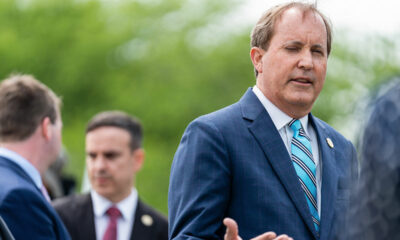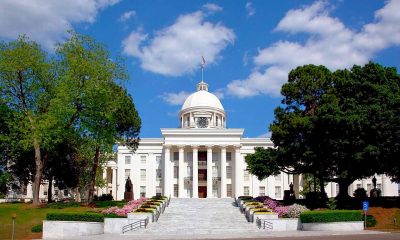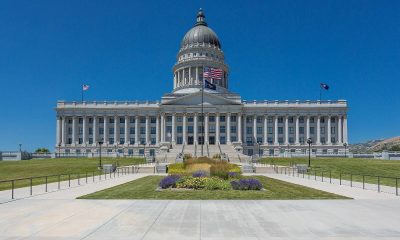Texas
North Texas superintendent orders books removed from schools, targeting titles about transgender people
The Granbury superintendent’s comments, made on a leaked recording, raise constitutional concerns, legal experts said.
This article originally appeared in The Texas Tribune
This article is co-published with ProPublica, a nonprofit newsroom that investigates abuses of power. Sign up for ProPublica’s Big Story newsletter to receive stories like this one in your inbox as soon as they are published. The story was also produced in partnership with NBC News.
 In early January, a day before students returned from winter break, Jeremy Glenn, the superintendent of the Granbury Independent School District in North Texas, told a group of librarians he’d summoned to a district meeting room that he needed to speak from his heart.
In early January, a day before students returned from winter break, Jeremy Glenn, the superintendent of the Granbury Independent School District in North Texas, told a group of librarians he’d summoned to a district meeting room that he needed to speak from his heart.
“I want to talk about our community,” Glenn said, according to a recording of the Jan. 10 meeting obtained and verified by NBC News, ProPublica and The Texas Tribune. Glenn explained that Granbury, the largest city in a county where 81% of residents voted for then-President Donald Trump in the 2020 presidential election, is “very, very conservative.”
He noted that members of Granbury’s school board — his bosses — were also very conservative. And to any school employees who might have different political beliefs, Glenn said, “You better hide it,” adding, “Here in this community, we’re going to be conservative.”
That’s why, he said, he needed to talk to them about some of the books available in the school district’s libraries.
For months, conservative parents and politicians across Texas had been pressuring districts to remove from school libraries any books that contain explicit descriptions of sex, labeling several young adult novels as “pornography.” Gov. Greg Abbott, a Republican, called for criminal investigations into school employees who make such content available to students.
Many of the titles targeted statewide have featured queer characters and storylines, but those calling for the books’ removal have repeatedly said they are concerned only with sex and vulgarity, not with suppressing the views of LGBTQ students and authors.
Glenn made a similar argument during his closed-door meeting with librarians in Granbury, which is about an hour’s drive southwest of Dallas.
“I don’t want a kid picking up a book, whether it’s about homosexuality or heterosexuality, and reading about how to hook up sexually in our libraries,” Glenn said.
He also made it clear that his concerns specifically included books with LGBTQ themes, even if they do not describe sex. Those comments, according to legal experts, raise concerns about possible violations of the First Amendment and federal civil rights laws that protect students from discrimination based on their gender and sexuality.
“And I’m going to take it a step further with you,” he said, according to the recording. “There are two genders. There’s male, and there’s female. And I acknowledge that there are men that think they’re women. And there are women that think they’re men. And again, I don’t have any issues with what people want to believe, but there’s no place for it in our libraries.”
Minutes later, after someone asked whether titles on racism were acceptable, Glenn said books on different cultures “are great.”
“Specifically, what we’re getting at, let’s call it what it is, and I’m cutting to the chase on a lot of this,” Glenn said. “It’s the transgender, LGBTQ and the sex — sexuality — in books. That’s what the governor has said that he will prosecute people for, and that’s what we’re pulling out.”
Over the next two weeks, the school district embarked on one of the largest book removals in the country, pulling about 130 titles from library shelves for review. Nearly three-quarters of the removed books featured LGBTQ characters or themes, according to a ProPublica and Texas Tribune analysis. Others dealt with racism, sex ed, abortion and women’s rights.
Two months later, a volunteer review committee voted to permanently ban three of the books and return the others to shelves. But that may not be the end of the process.
In his recorded comments to librarians, Glenn described the review of 130 titles as the first step in a broader appraisal of library content, and a new policy approved by the school board later in January grants him and other administrators broad authority to unilaterally remove additional titles they deem inappropriate, with no formal review and no way for the public to easily find out what has been pulled from shelves.
Legal, education and First Amendment experts contacted by ProPublica, NBC News and the Tribune said the audio of the superintendent, combined with the decision to abruptly remove books from circulation, even temporarily, raises constitutional concerns.
Glenn’s comments also call into question the district’s commitment to fostering a safe and inclusive school environment for LGBTQ students and could be grounds for a complaint to the Department of Education’s Office for Civil Rights, which enforces federal anti-discrimination laws, the experts said.
“This audio is very much evidence of anti-LGBTQ and particularly anti-trans discrimination,” said Kate Huddleston, a staff attorney with the American Civil Liberties Union of Texas, who reviewed the recording at the request of NBC News, ProPublica and the Tribune. “It is very much saying the quiet part out loud in a way that provides very significant evidence that book removals in the district are occurring because of anti-LGBTQ bias.”
In a written statement, Glenn said the district was committed to supporting students of all backgrounds. And although he said the district’s primary focus is educating students, “the values of our community will always be reflected in our schools.”
“In Granbury and across Texas we are seeing parents push back and demand elected officials put safeguards in place to protect their children from materials that serve no academic purpose, but rather push a political narrative,” Glenn said in the statement. “As a result, classrooms and libraries have turned schools into battle grounds for partisan politics.”
/https://static.texastribune.org/media/files/61b5b41ac4b353276a6449b3ed5f7dce/20220323%20Hood%20County%20Books%202.jpg)
None of Granbury’s school board trustees responded to messages requesting comment. District spokesperson Jeff Meador sent a statement emphasizing that all of the books permanently removed from shelves in Granbury are “sexually explicit and not age-appropriate” and noting that district libraries “continue to house a socially and culturally diverse collection of books for students to read, including books which analyze and explore LGBTQ+ issues.”
The three books the committee voted to remove were “This Book Is Gay,” a coming out guide for LGBTQ teens by transgender author Juno Dawson that includes detailed descriptions of sex; “Out of Darkness,” by Ashley Hope Pérez, a young adult novel about a romance between a Mexican American girl and a Black boy that includes a rape scene and other mature content; and “We Are the Ants,” by Shaun David Hutchinson, a coming-of-age novel about a gay teenager that includes explicit sexual language.
At least one member of the volunteer review committee was dissatisfied that only three books have been permanently removed so far, and she has started calling for a second review of the ones that have been returned.
“There are people who want to tear down values and force theirs and then also force acceptance,” Monica Brown, the committee member, said in a Facebook video following the decision. Brown did not respond to a request for comment.
One of the Granbury ISD employees in attendance at the Jan. 10 meeting with librarians said that regardless of which books are pulled from shelves or returned, Glenn’s comments left her afraid to display or purchase LGBTQ books going forward — a chilling effect that she said could limit the diversity of Granbury library catalogs for years to come. The staff member, who was not the source of the audio, spoke on the condition that she not be named, because she feared retaliation from the district.
“He literally said books on trans issues have no place in a school,” she said. “It was alarming.”
The superintendent’s comments reflect a broader national debate. Conservative state legislatures across the country have been considering bills to restrict the ways educators teach about gender and sexuality in schools. This month, the Florida Legislature passed the Parental Rights in Education bill, dubbed the “Don’t Say Gay” bill by its critics, which restricts or bans discussion of LGBTQ issues in the classroom.
Conservative activists and politicians pushing these changes nationally say the goal is to prevent teachers from having sensitive conversations with students unless the parents give their consent. Some have at times conflated sex and sexual orientation, accusing educators of attempting to “groom” young children because the teachers had discussed the existence of transgender people and same-sex relationships. Opponents contend that the measures discriminate against LGBTQ students and educators and violate federal laws meant to prevent discrimination in schools.
These changes coincide with attempts in several conservative states to limit the rights of transgender minors to participate in school sports and to access gender-affirming medical care. Last month, Abbott issued a directive — temporarily halted by a Texas judge — ordering the state’s child welfare agency to open abuse investigations into any reported instances of minors receiving such medical care, including the prescription of puberty blockers or hormones.
As superintendent of a district that’s home to more than 7,400 students, Glenn is responsible for implementing and enforcing policies that ensure that children are not discriminated against based on their gender identity or sexual orientation.
After listening to the recording of Glenn’s remarks, Lou Whiting, a nonbinary junior at Granbury High School, said they were outraged. Whiting and another student who’s part of the LGBTQ community said classmates at Granbury have harassed them at school, but they’ve avoided reporting the harassment because they worried administrators wouldn’t take their complaints seriously.
Glenn’s comments validated those fears, Whiting said.
“I don’t feel incredibly safe or welcomed by a large majority of the students at my school,” Whiting said. “I’ve been called slurs. I’ve been verbally attacked. I’ve been physically attacked. But it kind of feels worse when the attacks are coming from adults, from the people who are supposed to keep us safe.”
/https://static.texastribune.org/media/files/d32078c307dd4b4e44445a3bb7650945/20220323%20Hood%20County%20Books%203.jpg)
“A Very Conservative Board”
The meeting with librarians wasn’t the first time Glenn had publicly embraced socially conservative values in schools.
In 2014, when he was superintendent at another district, he and a pair of education professors wrote a book called “Daily Devotionals for Superintendents,” which lamented the legalization of same-sex marriage and the passage of state laws “making it a crime to counsel gay young people about changing their sexual orientation.”
In another section of the book, Glenn and his co-authors said those pushing for broader acceptance of “alternative lifestyles” and other cultural changes are doing so through the indoctrination of children in schools, as “was done by Hitler when he took over Germany.” They warned that school superintendents will face pressure to “recognize the demands of alternative life-style adults,” adding, “As a superintendent, you will have to be strong and courageous to stand against the onslaught of the enemy. Your country and your children’s future are at stake.”
Glenn, who arrived at Granbury ISD in 2018 following stints leading two other Texas districts, said he couldn’t recall if he wrote those specific passages, but he acknowledged co-authoring the book, adding, “It’s fair to say I am aware of its content.”
In November, voters in Granbury elected a pair of school board members who, while campaigning, also raised concerns about the spread of LGBTQ-affirming curricula in schools. Melanie Graft rose to local prominence after leading a conservative movement in 2015 to remove a pair of LGBTQ-themed picture books from the children’s section at Granbury’s public library. She ran alongside Courtney Gore, the co-host of a local far-right internet talk show.
As candidates, the women promised to stop the “indoctrination” of students and rid the district of educational materials they said promote LGBTQ ideology or what they referred to as critical race theory, a university-level academic framework based on the idea that racism is embedded in U.S. legal and other structures.
In the weeks after Graft’s and Gore’s election victories, Glenn began asking district administrators about several books, including “This Book Is Gay,” that an unnamed school board member had found on the district’s online card catalog, according to text messages obtained by a parent through an open records request and shared with the news organizations.
The text messages included screenshots of eight titles, all of which deal with LGBTQ topics, with the keyword search terms “gay,” “trans” and “gender” highlighted in some of the book descriptions.
In a December text message, Glenn asked an administrator in charge of overseeing district libraries if any of the books were physically on shelves and available to students. Librarians needed to have a sense of urgency in responding to community complaints about books, Glenn wrote, “otherwise this will consume us in the spring.”
The list comprised titles that were aimed at helping transgender and LGBTQ teens navigate life and that told teen love stories through an LGBTQ lens, as well as an LGBTQ-themed fairy tale. Although some of the books included descriptions of sex, others did not.
Glenn referred to concerns from a board member during his Jan. 10 meeting with librarians.
“We do have a very conservative board,” Glenn said, according to the recording. “They are elected, and recently more conservative. And so that’s what our community is. That’s what our job is.”
NBC News, ProPublica and the Tribune spoke to three Granbury teachers who were not present at the Jan. 10 meeting but who have listened to the recording and said they were troubled by Glenn’s remarks. The teachers said they’ve seen additional library books being pulled from district shelves — mostly young adult books containing talk of sex — that haven’t been subject to a formal review, raising concerns among staff members that content is being eliminated with no oversight from the public.
The teachers said they feared retribution and spoke on the condition of anonymity, citing Glenn’s comments advising educators against sharing opinions that don’t align with the conservative views of district leaders.
“I was disturbed that our superintendent would say those things,” one of the teachers said, referring to Glenn’s comments about there being no place for transgender and LGBTQ content in school libraries.
/https://static.texastribune.org/media/files/048cff13a855620477a10ced27f41d10/20220323%20Hood%20County%20Books%204.jpg)
Schools have wide latitude to remove library books that are deemed age-inappropriate or “pervasively vulgar.” But free speech advocates say Republican politicians and school districts have applied an overly broad definition to the phrase in recent months, mislabeling coming-of-age stories and sex-ed books as pornography.
“The most striking feature of the current crop of book challenges is this effort to mischaracterize literature and sexual education resources, which clearly have educational value, and stigmatizing them by claiming that they violate obscenity statutes,” said Deborah Caldwell-Stone, director of the American Library Association’s Office for Intellectual Freedom.
Under a 40-year-old U.S. Supreme Court legal decision, Island Trees School District v. Pico, a public school system can’t remove a book because school board members or administrators disagree with its viewpoints or ideas, including its discussion of LGBTQ identities.
The 1982 case dealt with the removal of books deemed “anti-American” and “anti-Christian” by a school district in Levittown, New York. At the time, a school board member testified that he believed it was his duty to make decisions for the school district that reflected the community’s conservative values. Those comments were echoed decades later in the Granbury superintendent’s directive to librarians.
“If the evidence shows that the motivation for a book removal is to keep these ideas from getting to children, then the courts are very skeptical,” said North Carolina attorney Neal Ramee, who advises school districts on constitutional issues. “That could potentially lead to a finding of a violation of the First Amendment.”
Justin Driver, a Yale Law School professor, former clerk for two Supreme Court justices and author of “The Schoolhouse Gate,” which analyzes legal battles over education, said the similarities between the Pico case and the Granbury situation are “striking and overwhelming.” As a result, he said, Glenn’s statements to librarians “would seem to place the school district in an unenviable litigating position.”
Yet because the Pico case was a divided opinion, some legal scholars said the issue is ripe for another appearance in front of the Supreme Court.
LGBTQ Students Push Back
On Jan. 11, a day after Glenn’s meeting with librarians, Kennedy Tackett, a 17-year-old senior at Granbury High School, was working in a student-run store on campus when one of her friends approached, looking upset.
The friend had been volunteering in the school library and noticed several boxes filled with books that had been taken off of shelves.
“She said, ‘Kennedy, a lot of them look like they’re LGBTQ,’” said Tackett, who is bisexual. “And so I immediately texted my parents, and I was like, ‘Hey, have y’all heard about this?’”
In the days that followed, Tackett and her father, a former school board trustee who has criticized the school district’s conservative shift, used public records requests to unearth what the district hadn’t shared publicly: the list of more than 130 books that librarians had been directed to immediately remove from shelves. (The records also included the December text messages about the eight LGBTQ books.)
Some of the 130 books had no sexual content whatsoever, including “George” by Alex Gino, a book meant for children in elementary school that tells the story of a transgender child who’s coming to terms with her gender identity.
Most of the books appeared to come from a larger list of 850 titles dealing with racism, sex and LGBTQ themes that had been compiled by state Rep. Matt Krause. The Republican lawmaker said in a letter sent to districts across Texas that the books might violate a new state law that restricts the ways teachers can talk about “currently controversial” issues, including racism and sexuality. Krause did not respond to a request for comment.
Tackett created an online petition calling on the district to return the books to shelves, quickly drawing more than 600 signatures. A couple of weeks later, on Jan. 24, she and several other LGBTQ students showed up at a meeting of the Granbury ISD board of trustees and called on the district to reverse course.
/https://static.texastribune.org/media/files/1d1b25ee6d0df66e2982f43e27b91fee/20220323%20Hood%20County%20Books%205.jpg)
Instead, the board voted to amend a district policy that required contested books to remain on shelves while a committee reviewed them, giving administrators more discretion to remove titles that they deem to lack “educational suitability.”
“The job of the superintendent and the school board is not only to protect the students in this district, but to make them feel like they have a place in this community,” Tackett told the board during public comments prior to the vote. “But I gotta tell you, from what I’ve seen so far, you are failing at your job.”
The comments, which would later go viral and be broadcast on national news reports, drew a rebuke from Glenn during the meeting. Glenn announced that the district had previously removed five books unrelated to LGBTQ themes that were written by Abbi Glines, an author known for including explicit sex scenes that push the boundaries of young adult fiction.
“Let’s not misrepresent things. We’re not taking Shakespeare or Hemingway off the shelves,” Glenn said, at one point referring to those who frequently speak out at school board meetings as “radicals” and emphasizing that the district was focused on sexually explicit content. “We’re not going and grabbing every socially, culturally or religiously diverse book and pulling them. That’s absurd. And the people that are saying that are gaslighters, and it’s designed to incite division.”
Those comments gave Whiting, the nonbinary Granbury junior, an idea: Using Granbury’s G logo, Whiting designed a T-shirt with the words “Radical Gaslighter” and created a page where students could buy them. They ended up selling nearly 250 to people all over the country, raising more than $2,000 for the American Library Association’s Freedom to Read Foundation.
By early February, word began to spread through Granbury that someone had recorded Glenn’s comments to librarians. The employee who’d made the recording did not post it publicly or share it with reporters, but soon a copy of it was circulating among a small group of educators and community activists.
/https://static.texastribune.org/media/files/c2dde0840d7ca6f50c5f4effeb18ba26/20220323%20Hood%20County%20Books%206.jpg)
That month, the ACLU of Texas sent a letter to Granbury calling on the district to apologize for the book removals and to release a statement affirming its commitment to “LGBTQ+ and racial inclusivity.” That was before Huddleston, the ACLU lawyer, reviewed the recording at the request of reporters.
Huddleston said the recorded comments also raise serious questions about what else has been said behind closed doors, not just in Granbury, but also in other districts where books are being banned.
“This is very strong evidence of what is happening in the background,” she said. “But it also raises a host of questions about all the other districts in Texas where this is happening and we don’t have audio.”
Tackett, the Granbury senior, cried after listening to the recording of Glenn’s remarks. She thought of his public comments accusing critics of trying to deceive the public about the district’s motivations for removing and reviewing books. If anyone was gaslighting the community, Tackett said, it was him.
“It’s unsettling,” she said. “You can’t just turn your back on the students you’re supposed to be protecting.”
Disclosure: The ACLU of Texas has been a financial supporter of The Texas Tribune, a nonprofit, nonpartisan news organization that is funded in part by donations from members, foundations and corporate sponsors. Financial supporters play no role in the Tribune’s journalism. Find a complete list of them here.
The Texas Tribune is a nonpartisan, nonprofit media organization that informs Texans — and engages with them – about public policy, politics, government and statewide issues.
Education
Texas colleges launch course reviews amid push to limit gender identity instruction
After a viral video stirred controversy at Texas A&M, Texas Tech ordered course adjustments while other university systems like UNT and UT launched reviews. It’s unclear what the reviews will look for.
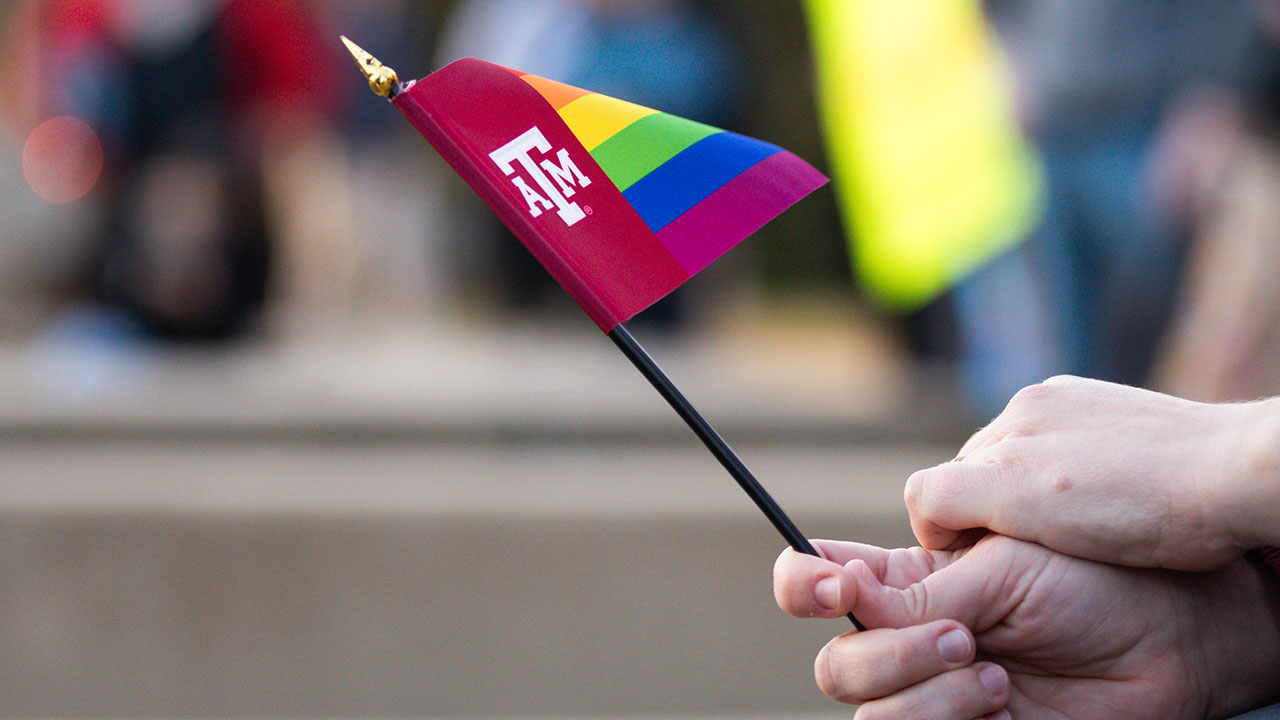
This article originally appeared in The Texas Tribune
 Last month, a viral video showing a Texas A&M University student confronting a professor over a discussion of gender identity during a children’s literature class sparked a firestorm in Texas higher education that has led other schools to review their academic offerings.
Last month, a viral video showing a Texas A&M University student confronting a professor over a discussion of gender identity during a children’s literature class sparked a firestorm in Texas higher education that has led other schools to review their academic offerings.
Texas A&M fired the professor in the video and former university President Mark A. Welsh III resigned. Seeking to preempt any similar controversy, the Texas Tech University System issued guidance last week instructing faculty to ensure that their courses comply with a federal executive order, a letter from Gov. Greg Abbott and a new state law that recognizes only two sexes.
Faculty and LGBTQ+ advocates fear the directive will limit classroom discussion of transgender and nonbinary identities. They warn the universities’ actions are the byproduct of political interference that threatens academic freedom and the quality of higher education in the state.
Brian Evans, president of the Texas Conference of the American Association of University Professors, said administrators should enable students to learn the widest set of topics by ensuring faculty can speak freely. He added that colleges and universities “have an obligation to develop campus policies that protect the Constitutional rights of their faculty to teach and research the subjects in their areas of expertise without intimidation or censorship.”
No law explicitly bars teaching topics like gender identity or the existence of more than two sexes. But Texas universities know their courses are under the microscope, with politicians and activists combing through catalogs and syllabi and demanding changes to any material they consider objectionable.
In the heels of Texas Tech’s guidance, at least three public university systems — the University of North Texas, the University of Texas and Texas Woman’s University — have ordered course reviews. They have framed the effort as ensuring compliance with state and federal law. But UT, UNT and TWU, unlike Texas Tech, did not specify which laws triggered the reviews. The systems did not say what actions their schools would take after the reviews.
Public universities are required to conduct curriculum reviews under Senate Bill 37, passed this year, but the first reviews aren’t due until 2027. The law directs governing boards to examine whether general education courses “are necessary to prepare students for civic and professional life” and “ensure a breadth of knowledge.” Earlier versions of the bill went much further, barring courses from promoting the superiority of any race, sex or religion, or from endorsing specific public policies or ideologies, but that language was cut before passage.
Here’s what public university systems and community colleges in the state have said so far:
Texas A&M University System
Chancellor Glenn Hegar announced on Sept. 9 a systemwide audit of course offerings, a day after Rep. Brian Harrison, R-Midlothian, posted a secretly recorded video of the children’s literature class.
The clip went viral, and within days, professor Melissa McCoul was fired, the dean of the College of Arts and Sciences and the head of the English Department were removed, and Welsh resigned under pressure from state leaders who said he had mishandled the controversy.
Hegar has not publicly detailed how the course review will be carried out or what criteria will be used.
Texas Tech University System
Chancellor Tedd Mitchell directed the presidents of the system’s five universities to review course materials, syllabi and curricula.
In a Sept. 25 letter, Mitchell told the university presidents to “make timely adjustments where needed” to comply with President Donald Trump’s Jan. 20 executive order, Gov. Greg Abbott’s Jan. 30 letter and House Bill 229, all of which recognize only two sexes, male and female. None of them directly requires or mentions restrictions on teaching.
“While recognizing the First Amendment rights of employees in their personal capacity, faculty must comply with these laws in the instruction of students, within the course and scope of their employment,” Mitchell wrote.
The order offered no details on how the reviews would be conducted, leaving faculty uncertain about what changes might follow and drawing criticism from free speech and LGBTQ+ advocates who called it censorship and accused it of being cruel to trans and nonbinary students.
Mitchell’s directive came after Angelo State University, part of the Texas Tech System, told faculty they could not discuss transgender and nonbinary identities in their classes, making it the first known public Texas university to restrict classroom acknowledgment of such gender identities.
University of North Texas System
On Sept. 29, Chancellor Michael Williams directed each UNT System institution to conduct an expedited review of its academic courses and programs, including a complete syllabi review, to ensure compliance with “all current applicable state and federal laws, executive orders, and court orders.” Campuses have until Jan. 1 to finish the reviews.
Although Williams’ letter did not mention Trump’s executive order, Abbott’s letter or House Bill 229 like Mitchell’s directive did, a UNT system spokesperson told The Texas Tribune they will be considered in the course reviews. But when asked whether the system believes those measures prohibit schools from teaching that there are more than two sexes, or what the reviews will specifically look for, the spokesperson said only that those questions “will be discussed in the reviews.”
University of Texas System
A UT System spokesperson told the Tribune that the system is reviewing “gender identity” courses across all campuses “to ensure compliance and alignment with applicable law and state and federal guidance, and to make sure any courses that are taught on UT campuses are aligned with the direction and priorities of the Board of Regents.” The review will be discussed at the regents’ November meeting, the spokesperson said.
The UT System did not cite any specific measures that had triggered the reviews. The spokesperson did not say whether the system was interpreting and applying the president’s executive order, the governor’s letter or House Bill 229 in the same way as Texas Tech did.
The UT System also did not clarify what “reviewing gender identity courses” means in practice or whether it intends to prohibit or alter such classes.
University of Houston System
The system did not respond Tuesday to the Tribune’s request for comment.
Texas State University System
The system did not respond Tuesday to the Tribune’s request for comment.
Texas Woman’s University System
Texas Woman’s University System is “in the process of establishing a review of academic courses and programs, in accordance with all applicable state and federal laws,”a spokesperson said. The system, which is the state’s newest and smallest with campuses in Denton, Dallas and Houston, did not specify what the review will look for or whether it could result in changes to courses or programs.
Community colleges
In the Houston area, San Jacinto College “has made faculty and staff aware” of Trump’s executive order, Gov. Abbott’s letter and House Bill 229, according to Amanda Fenwick, a spokesperson for the college. Faculty have been instructed to do a review of course content, she said.
“San Jacinto College is committed to understanding and following federal and state laws and ensuring that all employees — including faculty — are compliant,” Fenwick wrote in a statement to the Tribune.
As part of the review, faculty have been ordered to ensure course content is aligned with student growth goals, which are in the Texas Higher Education Coordinating Board’s Academic Course Guide Manual and Workforce Education Course Manual, Fenwick said.
Texas has 50 community colleges. It is unclear if any other school is planning to review their courses. The Tribune also reached out to Alvin Community College and Blinn College, but they have not responded.
Sneha Dey contributed to this story.
The Texas Tribune partners with Open Campus on higher education coverage.
Disclosure: Texas Tech University System and University of North Texas have been financial supporters of The Texas Tribune, a nonprofit, nonpartisan news organization that is funded in part by donations from members, foundations and corporate sponsors. Financial supporters play no role in the Tribune’s journalism. Find a complete list of them here.
The Texas Tribune is a nonpartisan, nonprofit media organization that informs Texans — and engages with them – about public policy, politics, government and statewide issues.
Education
Feds investigate another Texas school district for its gender identity mandate
Katy ISD’s board voted this past fall to require staff to notify parents if their child wants to use a different pronoun or identifies as a different gender.

This article originally appeared in The Texas Tribune
 The U.S. Department of Education’s Office for Civil Rights opened an investigation Monday into Katy Independent School District’s gender identity policy on the basis of gender harassment under Title IX. The investigation came nine months after the Houston Landing reported that the district adopted a policy that notifies parents if their child requests to use a different name or pronouns at school.
The U.S. Department of Education’s Office for Civil Rights opened an investigation Monday into Katy Independent School District’s gender identity policy on the basis of gender harassment under Title IX. The investigation came nine months after the Houston Landing reported that the district adopted a policy that notifies parents if their child requests to use a different name or pronouns at school.
Katy ISD did not respond to a request of how many parents have been notified this year under the new policy, which requires staff to inform parents that students are transgender or ask to use different names or pronouns.
The Houston Chronicle reported in December that the district had notified parents at least 23 times since the policy was adopted.
The gender identity policy also bars schools from teaching “gender fluidity” and denies students from competing in sports with the gender they identify with, which mirrors state legislation already regulating K-12 athletics.
Students Engaged in Advancing Texas, a student-led advocacy group, filed a complaint with the U.S. Department of Education in November regarding the policy. Katy ISD graduate and member of SEAT Cameron Samuels labels the investigation as a win against the conservative policies being passed in the district.
“Elected solely on platforms to target marginalized students, far-right school board candidates accomplished exactly what they were elected to do: weaponize identity and neglect students’ educational needs,” they said.
Title IX prohibits sex-based discrimination in educational settings or federally funded activities. Gov. Greg Abbott has loudly voiced his opposition to the federal law recently ordering the Texas Education Agency to disregard the Biden administration’s expansion of Title IX.
“The district is committed to offering equal educational opportunities to our entire community,” a spokesperson from Katy ISD told the Tribune in a response to the investigation. “While we have received the OCR filing and deny any wrongdoing, we are committed to remaining fully cooperative and responsive throughout the process.”
Victor Perez, Katy ISD board president and proponent of the policy, argued that the policy was “mischaracterized” by community members as an attack on its queer and transgender students and instead relieves the burden for staff withholding information from parents. The policy was passed at a board meeting in August with a vote of 4-3 after four hours of public comment.
Alastair Parker, a member of the Cinco Ranch High School Gender-Sexuality Alliance, spoke at the board meeting in opposition to the policy.
Parker and others argued that the policy infringes on the rights of transgender kids to express themselves and opens them to potential harm if they are outed to transphobic parents or caregivers.
Johnathan Gooch from Equality Texas, a nonprofit advocacy group for LGBTQ+ Texans, said he hopes students recognize their power to report policies like this in the wake of the increasing number of legislation targeting LGBTQ+ youth.
This isn’t the first instance in Texas of a gender related policy being investigated on the federal level. Carroll ISD in Tarrant County was reported to have eight open investigations last February after it eliminated protections over race, religion, gender and sexual orientation.
There are documented mental health benefits to using preferred pronouns. A research team at the University Texas at Austin conducted a study in which they concluded that students in gender-affirming environments report 71% fewer symptoms of severe depression, a 34% decrease in reported suicidal ideation and a 65% decrease in suicide attempts.
“When students place their trust in teachers and school administration, the school has a duty to preserve that trust,” Gooch said. “That duty requires schools to ensure that no disclosure would place a student in harm’s way.”
Parker has been out as a transgender man since the seventh grade and is supported by his father, who he resides with. He acknowledged that this isn’t the case for many of his classmates as some have parents that are less accepting.
His teachers have gone by his preferred name and pronouns for his entire high school experience. But since the policy has been enacted, he has seen some of his peers go by their deadnames fearing that their parents would be notified.
Over the past year, other schools across the state have adopted similar policies.
Keller ISD, which is also in Tarrant County, passed a policy in late June that prevents students from using their preferred name and pronouns or using restrooms with the gender they identify with.
The policy was met with retaliation from the Texas American Civil Liberties Union, writing in a letter to the district that the policy is “deeply invasive and unlawful for school administrators to interrogate students’ private medical information in this way.”
As the end of the school year nears, Parker observed the policy being enforced at varying levels of severity by teachers. The passing of legislation or policy like this deters from the ongoing health crisis for queer and transgender youth and is wholly unnecessary, he said.
“If a child’s not telling their parents something like that, it’s for a reason,” he said. “I know that most of the people who are in favor of this are the ones who bounce off whatever their parents have told them to repeat.”
Disclosure: Equality Texas has been a financial supporter of The Texas Tribune, a nonprofit, nonpartisan news organization that is funded in part by donations from members, foundations and corporate sponsors. Financial supporters play no role in the Tribune’s journalism. Find a complete list of them here.
The Texas Tribune is a nonpartisan, nonprofit media organization that informs Texans — and engages with them – about public policy, politics, government and statewide issues.
Amarillo
Appeals court considers whether West Texas A&M drag show was unconstitutionally banned
University President Walter Wendler canceled a drag performance last year, claiming such shows “denigrate and demean women.”
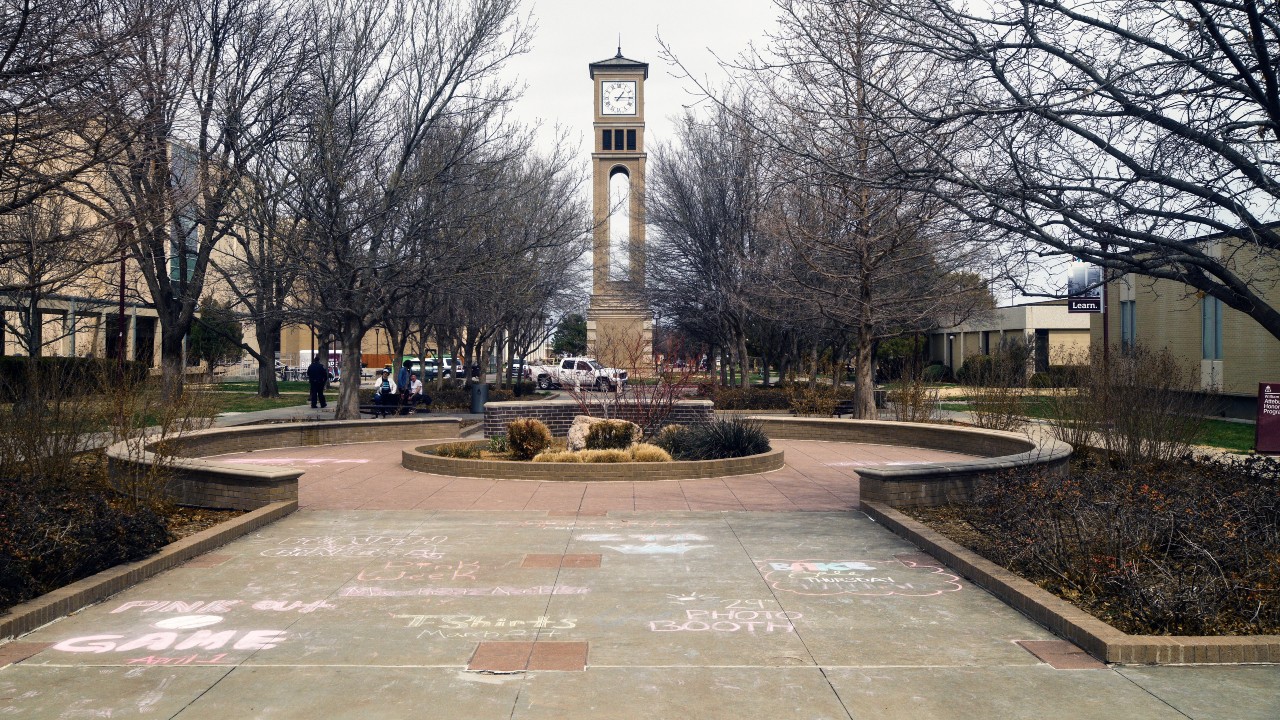
This article originally appeared in The Texas Tribune
 A federal appeals court considering whether West Texas A&M University’s president violated the First Amendment when he canceled a campus drag show last year focused many of their questions Monday on a U.S. Supreme Court ruling that upheld campus non-discrimination policies.
A federal appeals court considering whether West Texas A&M University’s president violated the First Amendment when he canceled a campus drag show last year focused many of their questions Monday on a U.S. Supreme Court ruling that upheld campus non-discrimination policies.
But the panel of three judges used that 2010 case — which said universities can require groups to admit LGBTQ+ students — to suggest that school officials could also ban drag shows because some people find the performances offensive to women.
A lawyer representing a group of West Texas A&M students who’ve twice attempted to host a drag show on campus argued before the 5th U.S. Circuit Court of Appeals Monday that President Walter Wendler discriminated based on viewpoint and censored speech when canceling the performances.
In March 2023, Wendler banned drag shows in response to a student fundraiser that featured drag performers. The president argued the performances “denigrate and demean women,” and shouldn’t be allowed on the public university’s campus.
In September, a federal judge said Wendler acted within his authority to cancel the drag show. In his opinion, U.S. District Judge Matthew Kacsmaryk wrote, at “this point in Free Speech jurisprudence, it is not clearly established that all ‘drag shows’ are categorically ‘expressive conduct.’”
Last month, students with WT Spectrum, the student group at the university, hoped to hold another drag show on campus — to show support for the LGBTQ+ community in a staunchly conservative corner of Texas.
With Wendler’s campus-wide ban still in place, the Supreme Court declined to intervene and the president again ordered the fundraiser from taking place.
The panel of judges hearing the appeal Monday were James Dennis, James Ho and Leslie Southwick.
Many of their questions centered around Christian Legal Society v. Martinez, a case in which the Supreme Court upheld a policy of the University of California, Hastings College of the Law, that bars student groups from excluding members based on status or beliefs.
In 2010, the Supreme Court affirmed that Hastings’ policy does not violate the First Amendment rights of CLS, a group of students that wanted to be officially recognized on campus while not allowing people who engage in “unrepentant homosexual conduct” from joining.
The 5th Circuit judges Monday seemed to suggest that Wendler’s ban was no different from the policy at the center of the 2010 Supreme Court case. One of the judges, who didn’t identify themselves before speaking, asked if plaintiffs intended to use the case in question to overturn CLS.
“Maybe we should overturn CLS?” one of three judges said. “Many people would like CLS overturned.”
Ho equated the policy upheld in CLS with Wendler’s drag ban. He said both intend to make everyone feel included, but the policies have the consequence of targeting one group. In CLS’ case, he said that Christians were singled out on Hastings’ campus for not allowing LGBTQ+ individuals to join. Ho said that previous groups on Hastings’ campus could exclude members, but CLS was singled out by the university’s non-discrimination policy.
JT Morris, senior attorney for the Foundation for Individual Rights and Expression who represented the students, argued that the judges were comparing “apples to oranges” between the two cases.
Morris argued CLS is about a content-neutral policy, while Wendler was clearly discriminating based on viewpoint.
“The First Amendment does not allow the government to use the subjective term ‘offensive’ to restrict speech,” Morris said.
Joseph N. Mazzara, a lawyer with the Texas Attorney General’s Office who represented Wendler, said the students had not suffered any injury as a result of the no-drag policy because there was no future event featuring drag performers planned. Additionally, Mazzara said Wendler’s policy carried no criminal penalties and students could host drag performances off campus.
Mazzara said Wendler’s ban was not a free speech violation, but rather it was akin to banning certain conduct, like skateboarding on the grounds of a monument. He said drag shows constituted conduct, not speech.
“They’re able to do everything they want to do, they’re able to say all the speech they want to [say],” Mazzara said, referring to the student group WT Spectrum. “They just can’t do this one particular thing in this one particular place.”
A judge asked Mazzara how the university would have treated drag shows put on by other student groups, such as a fraternity. The judges seemed to agree with Mazzara that Wendler’s restriction did not target a specific viewpoint.
“If a Christian legal group wanted to have a ‘Drag for Jesus’ event that would also be banned,” Mazzara said.
One judge suggested that some drag shows are offensive to the transgender community, and thus Wendler’s ban would equally protect that population from offensive performances.
Allison Marie Collins, another lawyer from the Attorney General’s Office representing other defendants named in the lawsuit, argued the appellate judges should not impose any restrictions on Texas A&M system Chancellor John Sharp or West Texas A&M Vice President for Student Affairs Christopher Thomas. She argued an injunction against Sharp or Thomas would be overbroad, because it’s clear that only Wendler has acted to stop these shows.
“Neither Chancellor Sharp nor Dr. Thomas have remotely engaged in viewpoint discrimination, exclusion from a public forum or a prior restraint complaint to speech,” Collins said.
In his rebuttal, Morris argued the plaintiffs have standing over Sharp because he has the authority over Wendler to put an end to this restriction on free speech.
“He has the authority to do what’s best for the campus,” Morris said of Sharp. “He should have put an end to this prior restraint, which shouldn’t have lasted a day, and has now lasted a year.”
Disclosure: Texas A&M University and West Texas A&M University have been financial supporters of The Texas Tribune, a nonprofit, nonpartisan news organization that is funded in part by donations from members, foundations and corporate sponsors. Financial supporters play no role in the Tribune’s journalism. Find a complete list of them here.
The Texas Tribune is a nonpartisan, nonprofit media organization that informs Texans — and engages with them – about public policy, politics, government and statewide issues.




